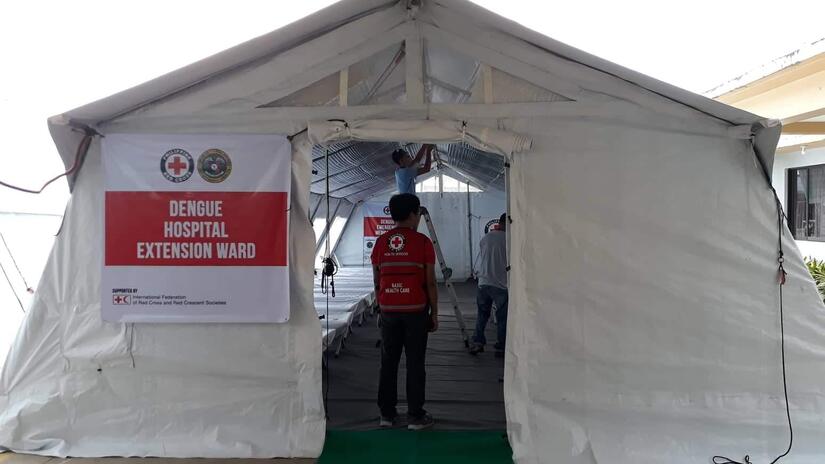Manila/Kuala Lumpur/Geneva, 26 July 2019 – Urgent action is needed to contain a dengue outbreak in the Philippines as cases continue to soar and an unprecedented nationwide emergency alert is issued, the International Federation of Red Cross and Red Crescent Societies (IFRC) and Philippine Red Cross are warning.
The Philippines is experiencing an alarming dengue outbreak with more than 115,000 cases reported since the beginning of the year – 85 per cent more than during the same period in 2018. To date, dengue has already led to 491 deaths, 30 per cent of them children between the ages of 5 and 9.
The significant spike in dengue is particularly alarming as the monsoon season is only starting in the country. Dengue cases peak during and after monsoon rains, raising concerns that a severe epidemic may threaten the nation in the coming months.
The Philippine Red Cross is supporting government efforts to stem the outbreak. Philippines Red Cross Chairman and CEO, Richard Gordon said: “Dengue is one of the fastest spreading viral diseases and children are particularly vulnerable. Tens of thousands of patients are streaming into overcrowded hospitals. Our 2 million volunteers across the country are in the communities raising awareness about preventing infections and when to seek treatment, organising clean-up drives for mosquito breeding sites and supporting overcrowded hospitals.”
The IFRC has released nearly 150,000 Swiss francs (7.2 million Philippine peso) from its Disaster Relief Emergency Fund to support the Philippine Red Cross scale up dengue treatment tents at ten hospitals and provide volunteer nursing staff to care for up to 15,000 patients and their family members. The Red Cross is targeting 300,000 people in at-risk communities with critical information on getting early treatment.
Chris Staines, the Head of IFRC’s Philippines office said: “We need to work together to save lives and contain the outbreak which we fear will worsen during the monsoon. Dengue can be stopped in its tracks, but families need to protect themselves from mosquito bites and seek medical treatment if they experience any symptoms such as high fever, headaches, nausea and joint pains.”
The current spike in dengue infections comes at the same time as the Philippines continues to deal with a deadly measles outbreak that has stretched healthcare capacities across the country. Elsewhere in South-East Asia, Red Cross teams in Cambodia, Laos, Thailand and Vietnam are also responding to spiking dengue cases.
Press release
Climate situation wreaks havoc in Asia Pacific; causing relentless floods, diseases, and life-threatening heat
Climate situation wreaks havoc in Asia Pacific; causing relentless floods, diseases, and life-threatening heat
| Press release

